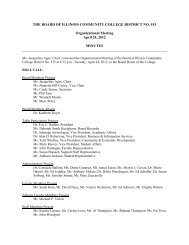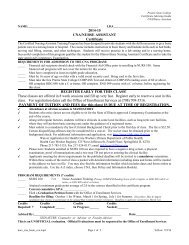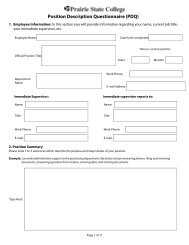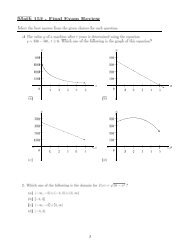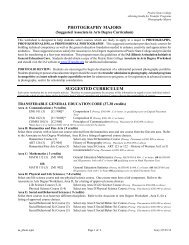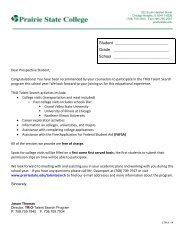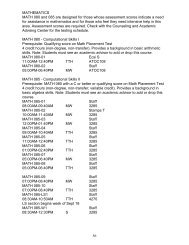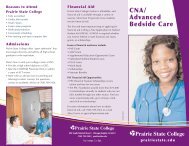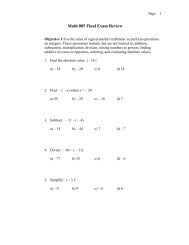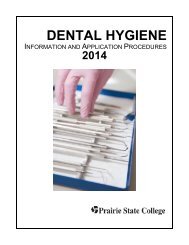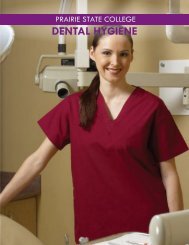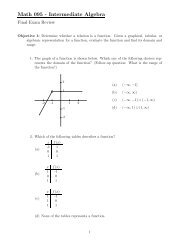DEGREES,CERTIFICATES,COURSESDEGREES, CERTIFICATES, COURSESTRANSFER DEGREESASTRONOMYA.S. Degree • Suggested CurriculumThe astronomer is concerned with the earth and its position inthe solar system and the universe. Employment opportunitiesinclude the National Aeronautics and Space Administration(NASA), air traffic control, and weather forecasting and monitoring.In the typical four-year curriculum, the first two yearsare spent studying the basic sciences, including mathematics andphysics. The last two years emphasize advanced mathematicsand science courses. <strong>Prairie</strong> <strong>State</strong> <strong>College</strong> offers courses comparableto the first two years of the curriculum and will grantthe Associate in Science degree to successful students.I. GENERAL EDUCATION CORE (39-40)Area A: Communication (9 credits)ENG 101 [C1 900] Composition I - with a grade of C or better (3)ENG 102 [C1 901R] Composition II - with a grade of C or better (3)COMM 101 [C2 900] Principles Communication (3)Area B: Humanities and Fine Arts (9 credits)Select three courses from the list for Area B on pages 42-44, with atleast one course from humanities and one course from fine arts.Area C: Mathematics (5 credits)MATH 171 [M1 900-1] Calculus with Analytic Geometry I (5)Area D: Physical and Life Sciences (7-8 credits)ASTRO 104 [P1 906L] The Solar System and Beyond (4)Life Science Elective (3-4)Area E: Social and Behavioral Sciences (9 credits)Select three courses in at least two different disciplines from the list forArea E on pages 42-44.II.AREA OF CONCENTRATION/MAJOR FIELD (17)MATH 172 Calculus with Analytic Geometry II (5)PHYSI 210 University Physics I (4)PHYSI 220 University Physics II (4)PHYSI 230 University Physics III (4)III. ELECTIVES (5-6)Select additional science, calculus, and foreign language courses or othergeneral education core courses.Required A.S. Degree Program Total: 62 creditsForeign Language Requirements: Some universities have a foreign languagerequirement. Generally, four years of a single foreign language in high schoolor four semesters of language in college will fulfill this requirement. It isrecommended that students complete the entire sequence at one institution.BIOLOGICAL SCIENCESA.S. Degree • Suggested Curriculum2006-2008 CATALOGBiology, the study of living organisms, is an extremely large anddiverse field. Career opportunities exist in many areas such asresearch, government agencies (conservation department, environmentalprotection, etc.), industry, sales, and teaching at alleducational levels. In addition, the biology curriculum providesthe pre-professional foundation for many of the health careerareas. Baccalaureate biological science programs are diverse.Some programs emphasize cell and molecular biology, whereasothers emphasize organismal, ecological, and evolutionary biology.Research universities offer specific programs of study,optional tracks, or specializations within biology. Studentsshould decide the direction or specialization within biology asearly as possible, preferably by the beginning of sophomoreyear. Students are strongly encouraged to complete theAssociate in Science degree prior to transfer.I. GENERAL EDUCATION CORE (39-41)Area A: Communication (9 credits)ENG 101 [C1 900] Composition I - with a grade of C or better (3)ENG 102 [C1 901R] Composition II - with a grade of C or better (3)COMM 101 [C2 900] Principles of Communication (3)Area B: Humanities and Fine Arts (9 credits)Select three courses from the list for Area B on pages 42-44, with atleast one course from humanities and one course from fine arts.Area C: Mathematics (3-5 credits)Select one math course from:MATH 115 [M1 902] General Education Statistics (3)MATH 153 [M1 902] Probability and Statistics (4)MATH 171 [M1 900-1] Calculus with Analytic Geometry I (5)Area D: Physical and Life Sciences (9 credits)BIOL 112 [BIO 910] Organismal Biology (4)CHEM 110 [BIO 906] General Chemistry I (5)Area E: Social and Behavioral Sciences (9 credits)Select three courses in at least two different disciplines from the list forArea E on pages 42-44.II. AREA OF CONCENTRATION/MAJOR FIELD (17-19)Select a minimum of 21-22 credits from the foundation courses listedbelow.BIOL 111 [BIO 910] Cellular and Molecular Biology (4) requiredCHEM 130 [BIO 907] General Chemistry II (5) requiredSelect 2 courses in physics, or 2 courses in chemistry, or 1 course eachin each from:CHEM 203 [BIO 908] Organic Chemistry I (5)CHEM 204 [BIO 909] Organic Chemistry II (5)PHYSI 210 [BIO 903] University Physics I (4)PHYSI 220 [BIO 904] University Physics II (4)III. ELECTIVES (2-6)Select one course from CHEM 203, 204 or PHYSI 210, 220 if notalready selected from Area II above, or any additional BIOL course.Courses such as microbiology and human anatomy and physiologysometimes will transfer for credit in allied health majors, but mostoften do not transfer as biology major credit.Required A.S. Degree Program Total: 62 creditsForeign Language Requirements: Some universities have a foreign languagerequirement. Generally, four years of a single foreign language in high schoolor four semesters of language in college will fulfill this requirement. It isrecommended that students complete the entire sequence at one institution.48
2006-2008 CATALOGBUSINESSA.A. Degree • Suggested CurriculumBusiness programs at community colleges and bachelor’s degreeinstitutions include courses and majors in general business,accounting, finance, marketing and management. The following recommendationsapply to programs in all of these fields. These aresuggested courses which are designed to satisfy requirements inthe Associate in Arts Degree at <strong>Prairie</strong> <strong>State</strong> <strong>College</strong> and to providethe basis for transferring to a four-year institution.I. GENERAL EDUCATION CORE (38-40)Area A: Communication (9 credits)ENG 101 [C1 900] Composition I - with a grade of C or better (3)ENG 102 [C1 901R] Composition II - with a grade of C or better (3)COMM 101 [C2 900] Principles of Communication (3)Area B: Humanities and Fine Arts (9 credits)Select three courses from the list for Area B on pages 42-44, with atleast one course from humanities and one course from fine arts.PHILO 202 [H4 904] Ethics (3) recommendedArea C: Mathematics (4-5 credits)Select one math course from:MATH 157 [M1 900-B] Calculus for Business & Social Science (4)MATH 171 [M1 900-1] Calculus with Analytic Geometry I (5)Area D: Physical and Life Sciences (7-8 credits)Select one life science course and one physical science course from thelist for Area D on pages 42-44. One course must have a lab component.Area E: Social and Behavioral Sciences (9 credits)Select three courses in at least two different disciplines from the list forArea E on pages 42-44.ECON 201 [S3 901] Macroeconomic Principles (3) recommendedECON 202 [S3 902] Microeconomic Principles (3) recommendedII. AREA OF CONCENTRATION/MAJOR FIELD (14)BUS 131 [BUS 903] Financial Accounting (4)BUS 132 [BUS 904] Managerial Accounting (3)BUS 240 [BUS 901] Elementary Statistics (4)ITAPP 101 [BUS 902] Introduction to Computers (3)III. ELECTIVES (8-10)BUS 101 [BUS 911] Introduction to Modern Business (3)BUS 201 [BUS 912] Business Law I (3)ORBUS 210 [BUS 913] Business Law and Its Environment (3)Select any other course (2-4)SPECIAL NOTE: Courses such as Principles of Management, Principles ofMarketing, Principles of Finance, Intermediate Accounting, and Cost Accounting,etc., are considered junior-level or upper-division courses at most universities.Some universities, though, will accept these courses as elective credit (but it oftenwill not count toward the hours you need for a major in business). Some haveprovisions for validating this credit. In this case, a student may be requested totake a proficiency examination, take the next course in sequence, or take a specificCLEP subject examination. Students are strongly advised to consult theinformation for the school of their choice before registering for these courses.Required A.A. Degree Program Total: 62 creditsCHEMISTRYA.S. Degree • Suggested CurriculumDEGREES, CERTIFICATES, COURSESTRANSFER DEGREESThe chemist is concerned with the application of scientificprinciples to practical problems. Employment opportunities forchemists include the complete spectrum of the workforce, theoreticalresearch activities, and problem-solving in management,marketing and production. Bachelor’s programs in chemistry arebuilt on an in-depth foundation of sequential courses in scienceand math, while upper-division courses provide the preparationnecessary for graduate studies and/or work in industry.I. GENERAL EDUCATION CORE (39-40)Area A: Communication (9 credits)ENG 101 [C1 900] Composition I - with a grade of C or better (3)ENG 102 [C1 901R] Composition II - with a grade of C or better (3)COMM 101 [C2 900] Principles of Communication (3)Area B: Humanities and Fine Arts (9 credits)Select three courses from the list for Area B on pages 42-44 with atleast one course from humanities and one course from fine arts.Area C: Mathematics (5 credits)MATH 171 [M1 900-1] Calculus with Analytic Geometry I (5)Area D: Physical and Life Sciences (7-8 credits)PHYSI 210 [P2 900L] University Physics I (4) recommendedSelect one life science from the list for Area D on pages 42-44 (3-4)Area E: Social and Behavioral Sciences (9 credits)Select three courses in at least two different disciplines from the list forArea E on pages 42-44.II. AREA OF CONCENTRATION/MAJOR FIELD (22-23)Select a minimum of 22-23 credits from the foundation courses listedbelow. Be aware that because of differences among schools in thenumber of credits for which various courses are offered, and the possibleneed for prerequisite courses, it may be difficult to complete anAssociate in Science degree without taking more credits than will beaccepted in transfer.CHEM 110 [CHM 911] General Chemistry I (5)CHEM 130 [CHM 912] General Chemistry II (5)CHEM 203 [CHM 913] Organic Chemistry I (5)CHEM 204 [CHM 914] Organic Chemistry II (5)MATH 172 [MTH 902] Calculus with Analytic Geometry II (5)MATH 173 [MTH 903] Calculus with Analytic Geometry III (5)PHYSI 220 [BIO 904] University Physics II (4)Required A.S. Degree Program Total: 62 creditsForeign Language Requirements: Some universities have a foreign languagerequirement. Generally, four years of a single foreign language in high schoolor four semesters of language in college will fulfill this requirement. It isrecommended that students complete the entire sequence at one institution.DEGREES,CERTIFICATES,COURSESForeign Language Requirements: Some universities have a foreign languagerequirement. Generally, four years of a single foreign language in high schoolor four semesters of language in college will fulfill this requirement. It isrecommended that students complete the entire sequence at one institution.49
- Page 1 and 2: A comprehensive community college20
- Page 3 and 4: 2006-2008 CATALOGIllinois Community
- Page 5 and 6: 2006-2008 CATALOGCONTENTSOVERVIEW:
- Page 7 and 8: 2006-2008 CATALOGOVERVIEWGETTING AC
- Page 9 and 10: 2006-2008 CATALOGOVERVIEWASSOCIATE
- Page 11 and 12: 2006-2008 CATALOGOVERVIEWIllinois E
- Page 13 and 14: 2006-2008 CATALOGENROLLMENTSTARTING
- Page 15 and 16: 2006-2008 CATALOGENROLLMENT7. Pay t
- Page 17 and 18: 2006-2008 CATALOGENROLLMENTSPECIAL
- Page 19 and 20: 2006-2008 CATALOGPOLICIES & GUIDELI
- Page 21 and 22: 2006-2008 CATALOGPOLICIES & GUIDELI
- Page 23 and 24: 2006-2008 CATALOGPOLICIES & GUIDELI
- Page 25 and 26: 2006-2008 CATALOGPOLICIES & GUIDELI
- Page 27 and 28: 2006-2008 CATALOGPOLICIES & GUIDELI
- Page 29 and 30: 2006-2008 CATALOGSTUDENT SERVICESFI
- Page 31 and 32: 2006-2008 CATALOGSTUDENT SERVICESFI
- Page 33 and 34: 2006-2008 CATALOGSTUDENT SERVICESOT
- Page 35 and 36: 2006-2008 CATALOGSTUDENT LIFEEXPERI
- Page 37 and 38: 2006-2008 CATALOGSTUDENT LIFENORTH
- Page 39 and 40: 2006-2008 CATALOGSTUDENT LIFECULTUR
- Page 41 and 42: 2006-2008 CATALOGDEGREES, CERTIFICA
- Page 43 and 44: 2006-2008 CATALOGILLINOIS ARTICULAT
- Page 45 and 46: 2006-2008 CATALOGFine Arts CoursesA
- Page 47 and 48: 2006-2008 CATALOGDEGREES, CERTIFICA
- Page 49: 2006-2008 CATALOGDEGREES, CERTIFICA
- Page 53 and 54: 2006-2008 CATALOGCOMPUTER SCIENCEA.
- Page 55 and 56: 2006-2008 CATALOGEARTH SCIENCE/GEOL
- Page 57 and 58: 2006-2008 CATALOGDEGREES, CERTIFICA
- Page 59 and 60: 2006-2008 CATALOGGENERAL MATH/SCIEN
- Page 61 and 62: 2006-2008 CATALOGLIBERAL ARTSA.A. D
- Page 63 and 64: 2006-2008 CATALOGPRE-MEDICINEA.S. D
- Page 65 and 66: 2006-2008 CATALOGPRE-OCCUPATIONAL T
- Page 67 and 68: 2006-2008 CATALOGPRE-PHYSICAL THERA
- Page 69 and 70: 2006-2008 CATALOGSOCIAL WORKA.A. De
- Page 71 and 72: 2006-2008 CATALOGDEGREES, CERTIFICA
- Page 73 and 74: 2006-2008 CATALOGCAREER PROGRAMSThe
- Page 75 and 76: 2006-2008 CATALOGAUTOMOTIVE ALIGNME
- Page 77 and 78: 2006-2008 CATALOGDEGREES, CERTIFICA
- Page 79 and 80: 2006-2008 CATALOGDEGREES, CERTIFICA
- Page 81 and 82: 2006-2008 CATALOGDEGREES, CERTIFICA
- Page 83 and 84: 2006-2008 CATALOGDEGREES, CERTIFICA
- Page 85 and 86: 2006-2008 CATALOGDEGREES, CERTIFICA
- Page 87 and 88: 2006-2008 CATALOGDEGREES, CERTIFICA
- Page 89 and 90: 2006-2008 CATALOGDEGREES, CERTIFICA
- Page 91 and 92: 2006-2008 CATALOGDEGREES, CERTIFICA
- Page 93 and 94: 2006-2008 CATALOGNURSINGContinuedNU
- Page 95 and 96: 2006-2008 CATALOGINDUSTRIAL ELECTRI
- Page 97 and 98: 2006-2008 CATALOGMANUFACTURING TECH
- Page 99 and 100: 2006-2008 CATALOGINFORMATION TECHNO
- Page 101 and 102:
2006-2008 CATALOGCOMPUTER REPAIR SP
- Page 103 and 104:
2006-2008 CATALOGSPREADSHEET - PROF
- Page 105 and 106:
2006-2008 CATALOGDEGREES, CERTIFICA
- Page 107 and 108:
2006-2008 CATALOGDEGREES, CERTIFICA
- Page 109 and 110:
2006-2008 CATALOGILLINOIS ARTICULAT
- Page 111 and 112:
2006-2008 CATALOGART 126 (IAI: F2 9
- Page 113 and 114:
2006-2008 CATALOGAUTO 214COLLISION
- Page 115 and 116:
2006-2008 CATALOGBIOL 225FUNCTIONAL
- Page 117 and 118:
2006-2008 CATALOGBUS 169MATERIALS H
- Page 119 and 120:
2006-2008 CATALOGBUS 270INTERNATION
- Page 121 and 122:
2006-2008 CATALOGCHEM 203 (IAI: BIO
- Page 123 and 124:
2006-2008 CATALOGCET 114DIGITAL FUN
- Page 125 and 126:
2006-2008 CATALOGDH 108CLINICAL DEN
- Page 127 and 128:
2006-2008 CATALOGEARLY CHILDHOOD ED
- Page 129 and 130:
2006-2008 CATALOGED 220CHILDREN’S
- Page 131 and 132:
2006-2008 CATALOGEMS 230PARAMEDICIN
- Page 133 and 134:
2006-2008 CATALOGENG 241CONTEMPORAR
- Page 135 and 136:
2006-2008 CATALOGFST 213FIRE SERVIC
- Page 137 and 138:
2006-2008 CATALOGGC 185DIGITAL SOUN
- Page 139 and 140:
2006-2008 CATALOGHIST 112 (IAI: S2
- Page 141 and 142:
2006-2008 CATALOGAPPIE 106DC MOTORS
- Page 143 and 144:
2006-2008 CATALOGAPPIE 290SPECIAL T
- Page 145 and 146:
2006-2008 CATALOGNETWORKING - ITNET
- Page 147 and 148:
2006-2008 CATALOGITPRG 141INTRODUCT
- Page 149 and 150:
2006-2008 CATALOGITWEB 220INTERNET
- Page 151 and 152:
2006-2008 CATALOGMAINTENANCE TECHNI
- Page 153 and 154:
2006-2008 CATALOGMATH 096GEOMETRYPr
- Page 155 and 156:
2006-2008 CATALOGMILLWRIGHT - APPRE
- Page 157 and 158:
2006-2008 CATALOGMUSIC 152 (IAI: MU
- Page 159 and 160:
2006-2008 CATALOGNURS 103TRANSITION
- Page 161 and 162:
2006-2008 CATALOGPHOTO 282EXPERIMEN
- Page 163 and 164:
2006-2008 CATALOGPE 163GOLFPrerequi
- Page 165 and 166:
2006-2008 CATALOGPLUMBING, PIPEFITT
- Page 167 and 168:
2006-2008 CATALOGREGISTERED NURSING
- Page 169 and 170:
2006-2008 CATALOGSRT 298SURGICAL TE
- Page 171 and 172:
2006-2008 CATALOGWELDER - APPRENTIC
- Page 173 and 174:
2006-2008 CATALOGGRADUATION & TRANS
- Page 175 and 176:
2006-2008 CATALOGGRADUATION & TRANS
- Page 177 and 178:
2006-2008 CATALOGDIRECTORYMEETING O
- Page 179 and 180:
2006-2008 CATALOGEXECUTIVE OFFICERS
- Page 181 and 182:
2006-2008 CATALOGDIRECTORYFACULTYFA
- Page 183 and 184:
2006-2008 CATALOGProfessor John Lim
- Page 185 and 186:
2006-2008 CATALOGCheryl Bland-Winbu
- Page 187 and 188:
2006-2008 CATALOGDIRECTORYSUPPORT S
- Page 189 and 190:
2006-2008 CATALOGDIRECTORYSUPPORT S
- Page 191 and 192:
2006-2008 CATALOGINDEXCollege Bowl
- Page 193 and 194:
2006-2008 CATALOGINDEXpre-Manufactu



